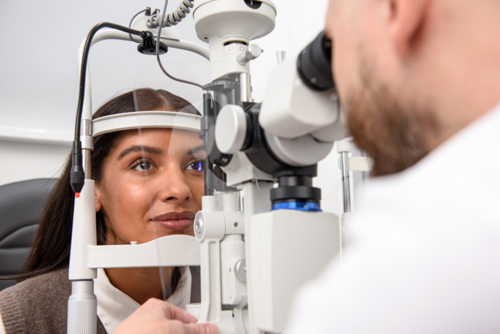Warning UK faces dramatic rise in number suffering sight-threatening eye disease
Leading charity warns UK’s eye health has hit a crisis point with more than 1.6 million new cases of sight-threatening eye disease forecast over the next decade [1] – the equivalent of one new case every three minutes!
The analysis carried out by Eye Health UK [2] for National Eye Health Week (22-28 September) uses data modelled by York Health Economics Consortium [3] to predict future cases of the four most common causes of sight loss – cataract, glaucoma, macular degeneration and diabetic eye disease.
Future forecasting predicts a 24 per cent rise in the number of people suffering late age-related macular degeneration – the UK’s leading cause of blindness and a 13 per cent surge in cases of glaucoma.
David Cartwright chair of Eye Health UK warns: “Urgent steps to tackle poor eye health, including greater uptake of sight tests and prevention strategies, are needed to avoid people suffering unnecessary and irrecoverable vision impairment. The good news though is half of all sight loss could be prevented with lifestyle changes, early detection, and timely treatment.”
Worryingly, four in ten Brits fail to have their eyes tested every two years, as recommended [4]; with many people, particularly those living in socio-economic deprivation, rationing eye test attendance due to concerns about the cost of glasses, or delaying check-ups until symptoms cause concern[5].
This behaviour prevents early detection of eye disease and timely referral for sight-saving treatment.
Despite more than 30 million people being entitled to free NHS sight tests [6], and NHS optical vouchers being available to help with the cost of eyewear for those on low incomes, children and for people with complex prescriptions; a lack of awareness of these benefits perpetuates barriers to people attending routine eye checks and increases the risk of avoidable sight loss.
More than half (55%) of people on low incomes say they’re unaware of their entitlement to free NHS sight tests and fewer still (just four in 10) know about NHS help towards the cost of prescription eyewear [7].
Responding to the research, David Cartwright chair of Eye Health UK comments: “Educating people about their entitlement to help with eye care costs is vital to improve uptake of routine sight tests and mitigate the rising prevalence of sight-threatening eye disease, that’s being driven by an ageing and unhealthy population.”
Conditions like macular degeneration can be detected early during routine eye tests, saving sight and reducing the economic burden of vision impairment – the lifetime cost of a new case of age-related macular degeneration (AMD) in an adult aged 50 or over, causing at least moderate visual impairment, is £73,350 [8].
Referral for medical treatment and adopting healthy lifestyle habits can halt or slow the progression of AMD.
Important lifestyle changes for AMD patients and those at risk of the disease include eating a healthy diet rich in fruits, leafy green vegetables, and omega-3 fatty acids; exercising regularly; quitting smoking; maintaining a healthy weight and protecting their eyes from the sun’s damaging UV.
To help people assess their chances of suffering future eye disease and understand how they can reduce the risks, the charity has created an eye health calculator which can be found on the vision matters website: http://visionmatters.org.uk/looking-after-your-eyes/eye-heal...
-ends-
For more press information or interviews contact:
Rachel Robson Tel: 07986 056380 Email: rachel@visionmatters.org.uk
Instagram @NationalEyeHealthWeek
Twitter @myvisionmatters
Facebook @NationalEyeHealthWeek
Notes to editors:
– Image of woman having her sight tested on a slit lamp during routine eye test attached. Credit Eye Health UK. Hi-res and alternative images available on request.
– According to the RNIB, there are currently around two million people are living with sight loss in the UK.
[1] Cases of cataract, glaucoma, diabetic retinopathy, diabetic maculopathy, age-related macular degeneration (late /neovascular) forecast to increase by 1,611,628 by 20235.
[2] Eye Health UK is a registered charity (no 1086146) responsible for running National Eye Health Week. visionmatters.org.uk.
[3] York Health Economics Consortium created the eye health data hub on behalf of optical associations including The College of Optometrists, Association of British Dispensing Opticians (ABDO), British & Irish Orthoptic Society (BIOS), Department of Health Northern Ireland, Federation of Optometrists and Dispensing Opticians (FODO) and The Royal College of Ophthalmologists. https://yhec.co.uk/about-us/
[4] Fieldwork conducted by OnePoll between 6-10 September on behalf of Eye Health UK. Nationally representative sample of 2,000 UK adults.
[5] Journal of Public Health, 36(4), 667–673
[6] Including those on low incomes, over 60’s, under 16s, people with certain eye conditions eg: glaucoma (and their close relatives) as well as everyone living in Scotland.
[7] EHUK (n,1)
[8] Fight for Sight, Time to Focus Report, 2020
This press release was distributed by ResponseSource Press Release Wire on behalf of National Eye Health Week in the following categories: Health, for more information visit https://pressreleasewire.responsesource.com/about.
